Washing dishes is never a fun chore. This is true no matter where you are but is even more so when you’re in an RV. A lack of a dishwasher, a tiny sink, and a cramped kitchen make this daunting chore even more unpleasant, and if the mountain of dishes gets too high, the idea of washing them can put anyone in a bad mood.
Still, the dishes will continue to pile up whether you want them to or not, and somebody has to wash them. If you’re reading this, that somebody is likely you, and that makes finding ways to make the task easier an important mission.
Luckily for you we’ve gathered a decent list of ways to make this task bearable, help you get the kitchen clean and back to having fun.
1. Wash regularly
This is perhaps the most useful tip on this list, but also the most obvious. A smaller RV sink does not have room for several days’ worth of dishes to be piled into, and any food left on these dishes is only going to stick harder as time goes on.
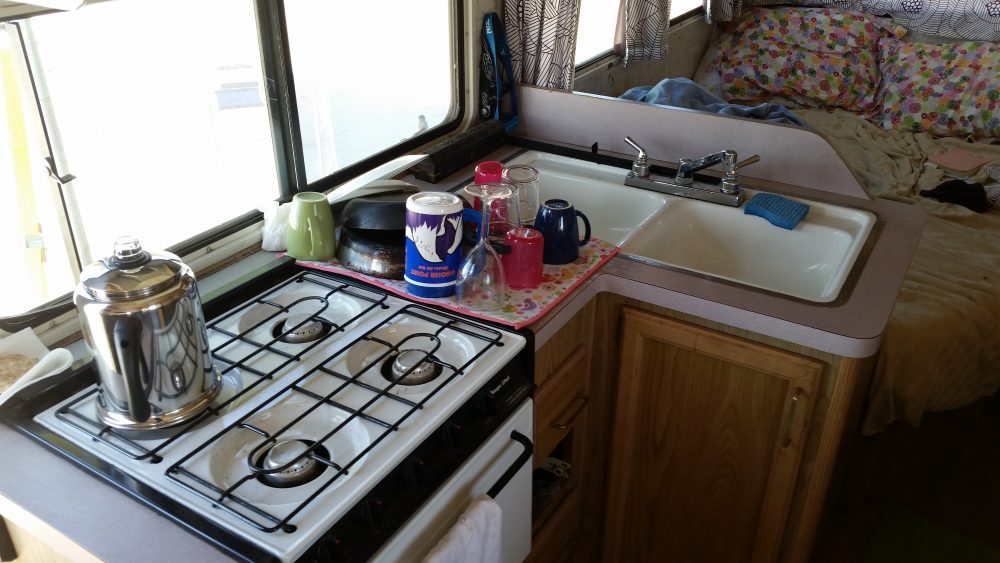
For this reason, we recommend making time to wash dishes after every meal if possible, but at least once a day. This will make the washing process easier by reducing the likelihood of impossibly stuck food and giving you more room to work with in your already small sink. It’ll also leave you feeling better about the cleanliness of your home-on-wheels by the end of the day.
2. Make one-pot meals
We’ve said it once, and we’ll say it again: an Instant Pot is the ideal appliance for RVers. One of the best things about this magical tool is the fact that it allows users to create entire meals while dirtying only one pot.
That said, slow cookers also allow for this—albeit slower—and most one-pot meals can even be made on a stove top.
3. Get a collapsible dish rack
While drying your dishes on a towel overnight generally works fine, a dish rack can be extremely helpful if you’re working with limited counter space. This is because the rack allows you to stack dishes in ways that wouldn’t be possible otherwise.
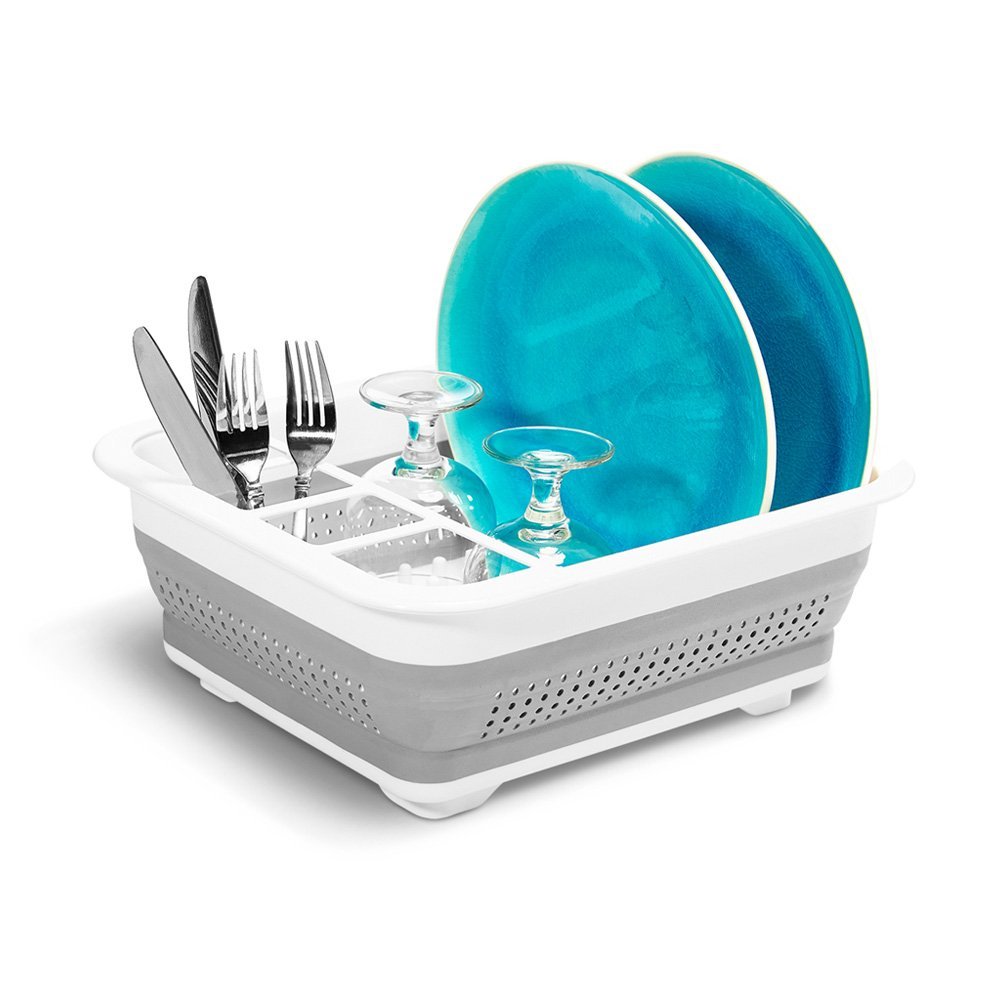
If you are worried about the storage space a dish rack will consume, consider a collapsible one like this. We also really love this wall-mounted version from IKEA for space-saving purposes.
4. Invest in quick-drying towels
Rarely are there enough places to hang things in a travel trailer or motorhome. This poses problems when you need to dry your dish towel as well as your bath towels and bathing suits. In fact, too many wet things hung to dry in an RV can leave the space feeling muggy and make it impossible for any of those items to dry properly.
This is where quick-drying towels step in. These nifty towels absorb plenty of water as you dry your dishes, and dry quickly no matter where you hang them.
5. Use a plug
Many people like to let the water run while washing dishes, and rinse items as they go. Unfortunately, this just doesn’t work well in an RV. Not only will you quickly run out of hot water, but you’ll be left with a full gray tank that could potentially overflow.

Instead of leaving the water running, use a plug and fill the sink with water. Even doing this three times—once for rinsing, once for washing, and once for rinsing again—will use less water than leaving the tap on the entire time.
6. Heat extra water
Rinsing dishes in cold water is no fun at all. It also isn’t nearly as effective as using hot water.
If you find yourself running out of hot water toward the end of your dish-washing sessions, you may find it helpful to heat some extra water using an electric kettle or the stove during your final rinse. This will ensure your dishes are left looking sparkly clean and your hands are kept nice and warm.
7. Go for disposable
While we don’t advocate using disposable dishes every day, there is something to be said for using paper plates when doing dishes is going to be more difficult than usual.
For instance, if you’re boondocking and have limited water supplies and tank space, it might be smart to make a temporary switch to disposable plates and bowls to conserve water. Another time to bring out the paperware is when you’re super busy sightseeing and won’t get to the dishes for a few days.
8. Purchase a dishwasher
Finally, you do always have the option of purchasing a dishwasher. Very few RVs come with such a luxurious item, but many can accommodate one. This model is one of our favorites, but almost any countertop dishwasher will work just fine.
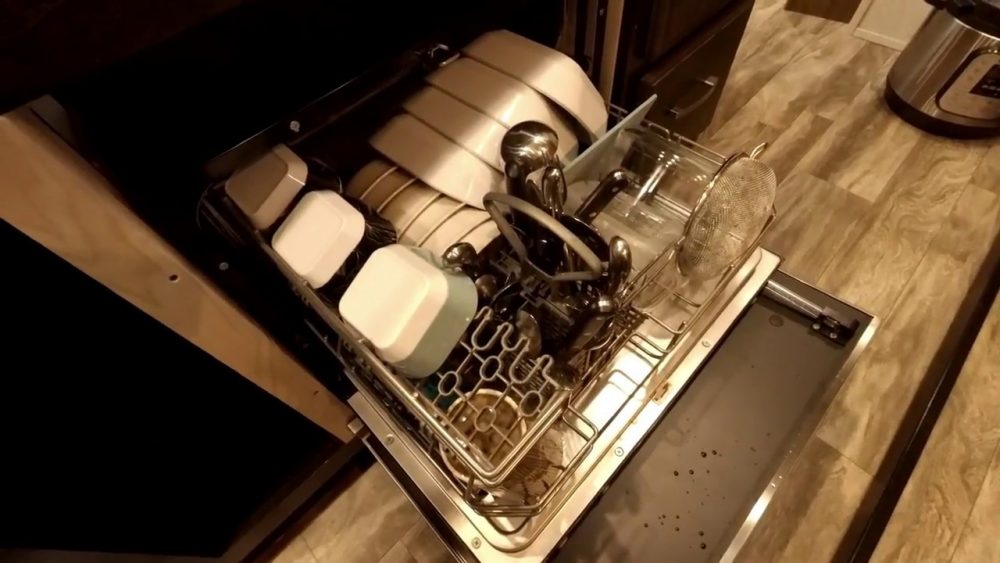
Another (perhaps less cumbersome and space-consuming) option is a built-in dishwasher like this one. Just be sure to install it correctly!

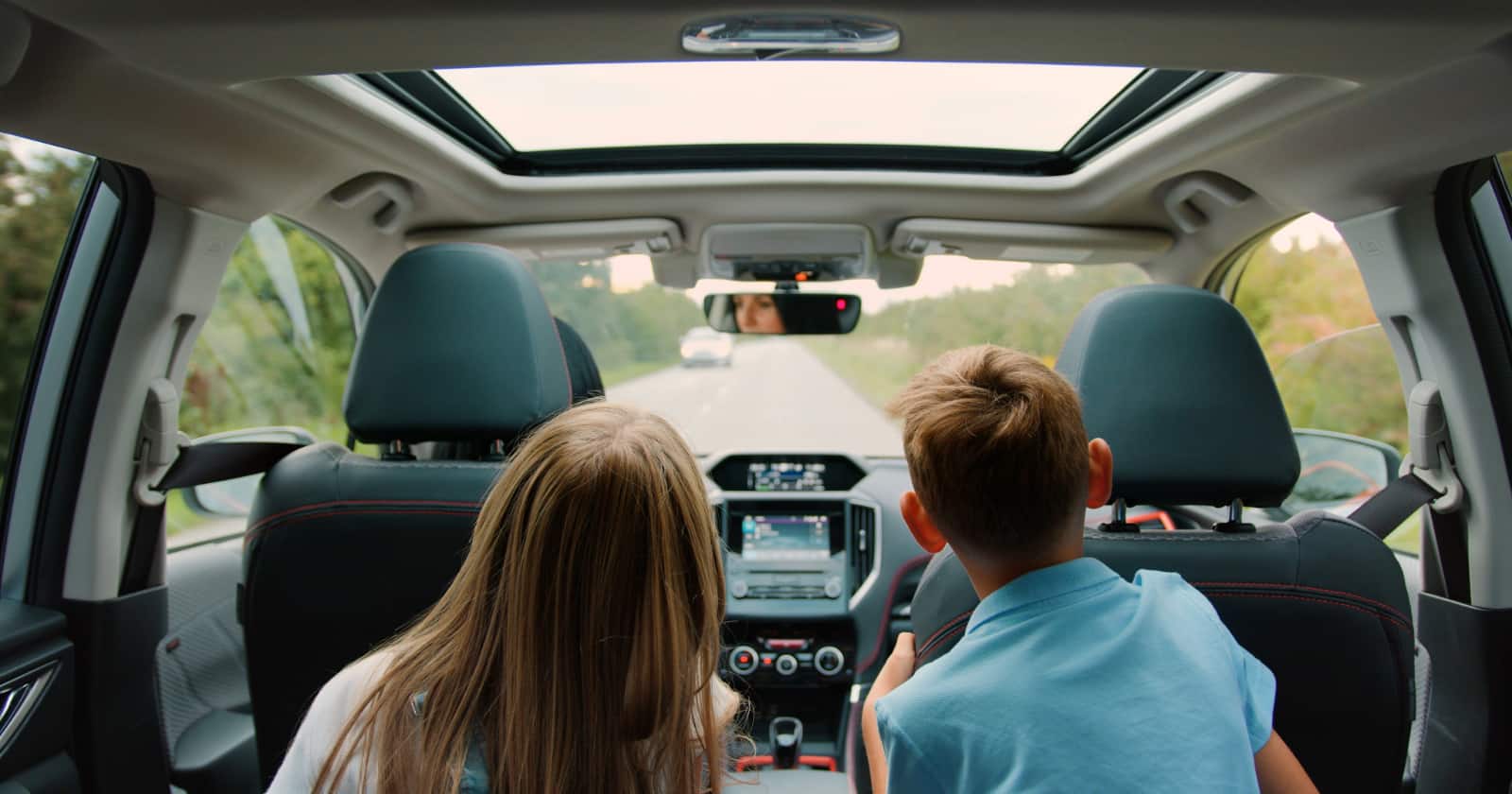
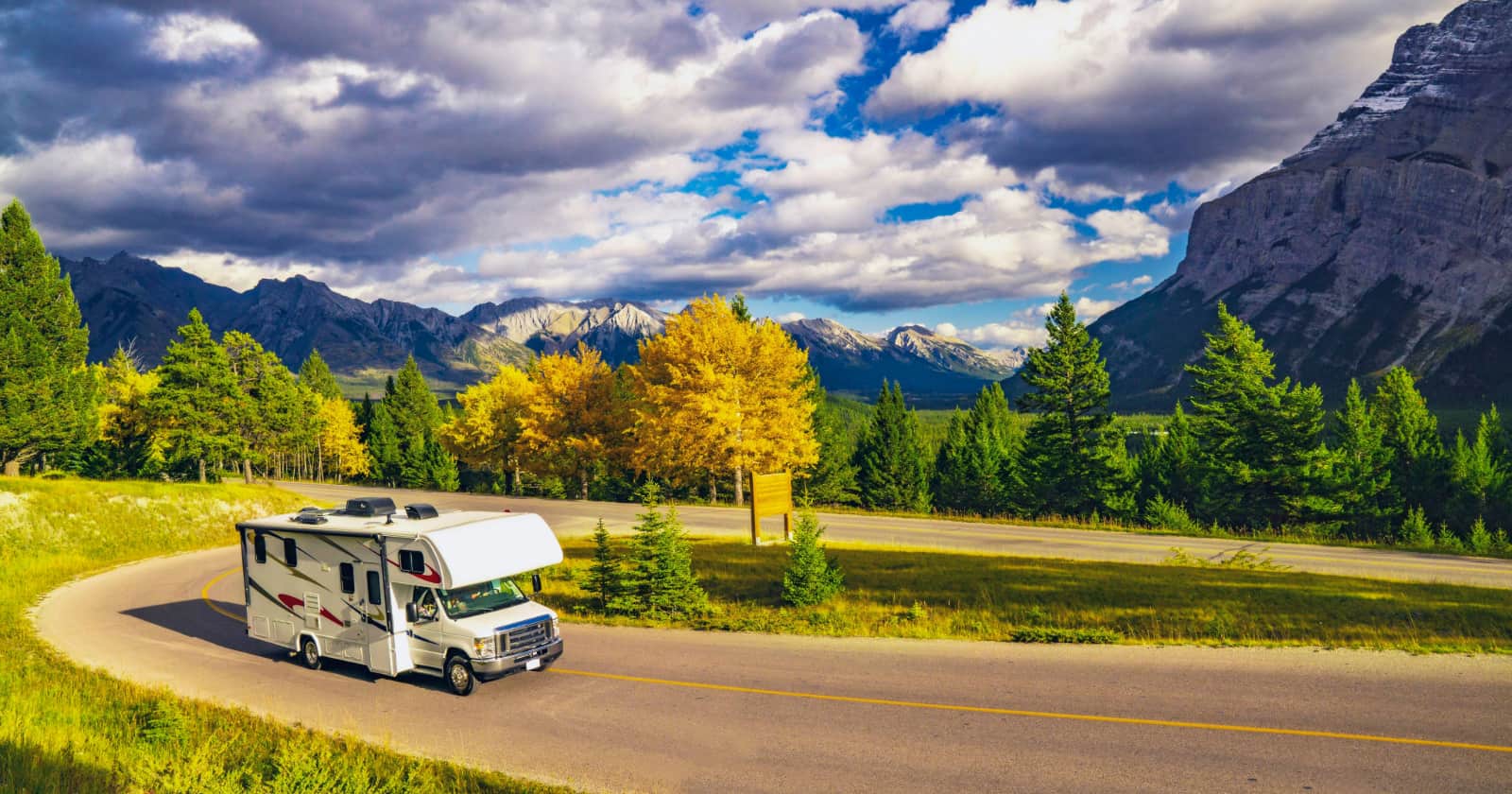
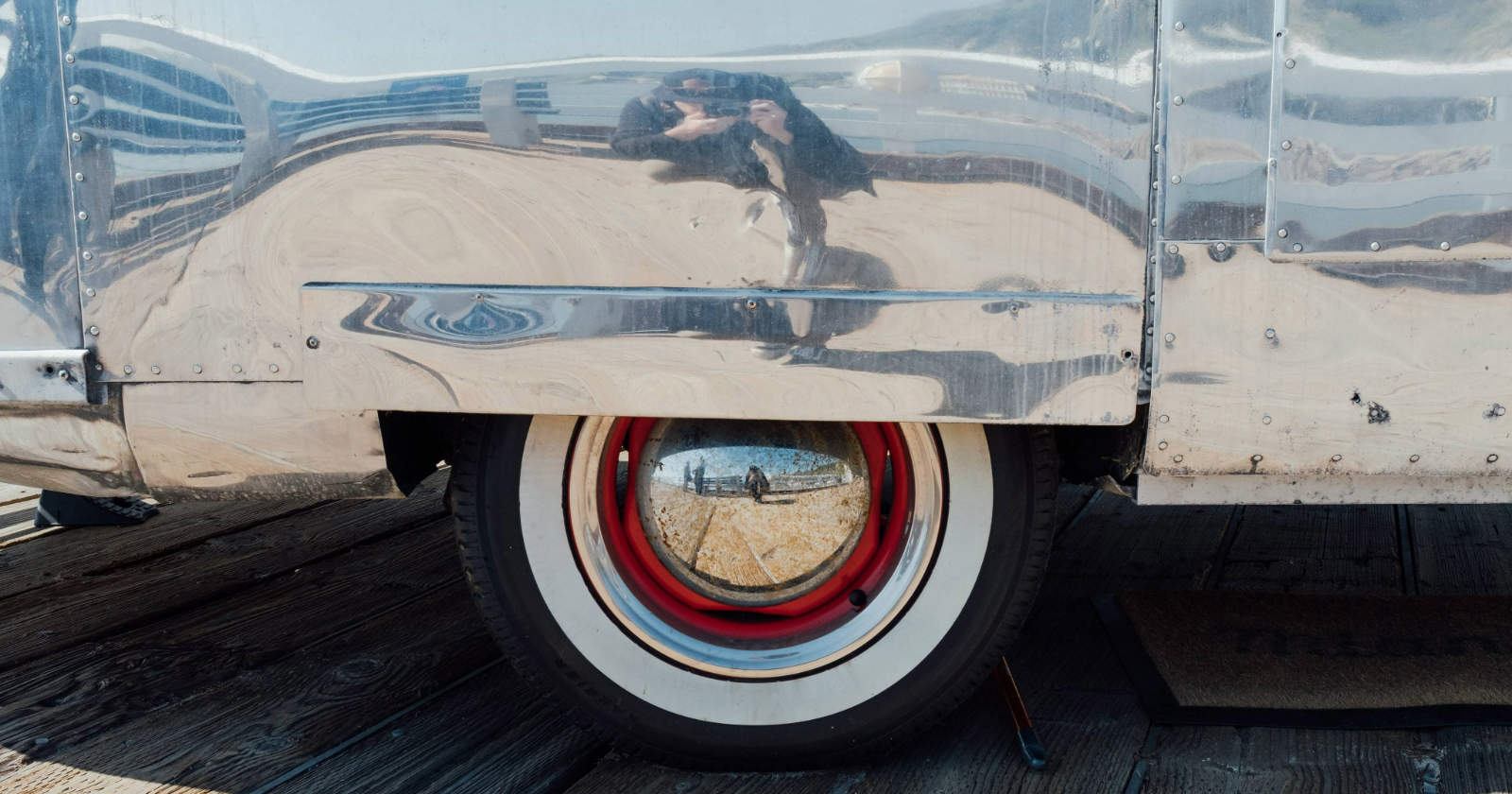
Our Labrador Retriever’s tongue does an amazing job of cleaning dishes. A Chihuahua will work but is a lot slower.
These are all excellent tips, but here is one I learned many years ago while traveling in a VW bus in Africa (where water was at a premium!) – Dishwashing detergent is thick and way too concentrated if you tend to put the soap on your sponge/dishrag (rather than filling a whole dishpan). Because it’s so concentrated, you use a lot of extra water just to rinse out your sponge or rinse the dishes. INSTEAD: Keep a bottle of dishwashing detergent at the sink that you have diluted with water (20% soap, 70% water). It is still incredibly good at cutting grease and cleaning dirty dishes plus you’ll find that final cleanup takes far less water consumption.
We Boon-dock mostly and do all the above, with these added. I use a dish pan for soapy water and a large kettle of cold water to rinse in, then to a strainer. The soapy water goes into the flush or is saved for hand washing in the bathroom. The rinse water is boiled and used as the soapy water next time I wash dishes. This works when you aren’t moving and are in a dry camp. From Oregon
A really good dish scraper is great. I have a flexible spatula type that gets off just about every spec of food. Makes washing up much easier and saves water and paper waste.
My 20′ Rialta is short on counter space so I bought a turkey roasting pan for $2 at a thrift shop and use it to store my dirty dishes (wiped with a paper towel after use); when I have enough to wash, I fill one side of the roaster with water from the campsite spigot, heat it on my propane stove and wash the dishes (using a minimal amount of biodegradable dish soap), putting them in the other side of the roaster where I rinse them. The dishes are set on a towel/tablecloth to dry on the outside table, and the dishwater/rinse water is used to mop floors or wash the outside of my Rialta. I use the closed roasting pan as a step-stool outside my coach door until it has housed enough dishes for the next load.
Those are some good ideas (Grumpy), thanks for posting!
We learned years ago, from old timers, to wipe all of our dishes with paper towel after meals. This keeps food particles out of our gray tank and keeps down the smell…
just rinse dishes after use until evening then do them, it makes it easier to clean!
We do dishes once a day, usually after the evening meal. Actually, I do the dishes, Mrs. Grumpy is the chef. We wipe excess food, grease and any gloppy stuff off of dishes with paper towels immediately after use. And we add a drop of soap and some water to any greasy dishes to let them soak during the day. Same for a glass or cup and soak wiped silver ware until dish washing time. By doing these little steps throughout the day, the dishes are easier to wash and fewer food scraps and grease go into our gray tank when we do wash.